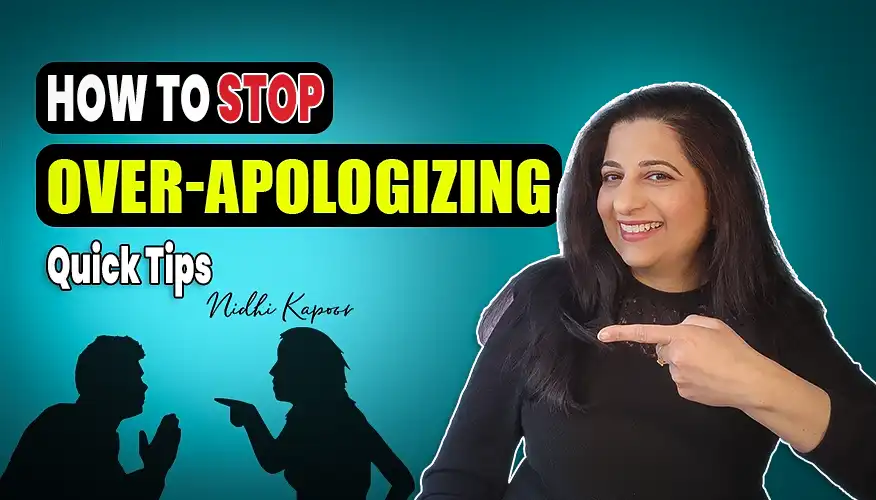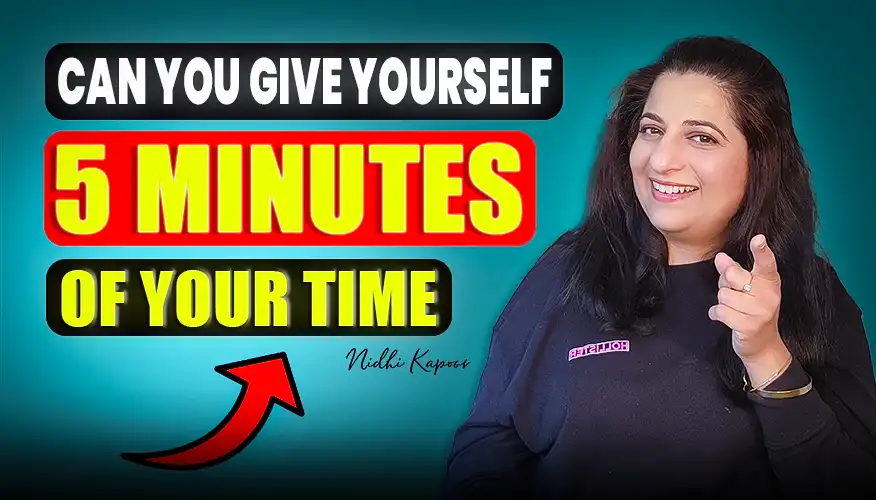Hello, wonderful souls! This blog is all about liberating ourselves from the unnecessary habit of how to stop over-apologizing. So, join me on this journey as we uncover why we do it, how it affects relationships both personally and professionally, and, most importantly, explore practical steps to stop saying sorry unnecessarily. Let’s embark on this transformative voyage together!
The Sorry Cycle
Do you often apologize even when it’s not needed? Many people develop this habit without realizing it. Research shows that frequent apologizing can be tied to increased anxiety and lower self-esteem. Today, let’s unravel the reasons behind over-apologizing, its effects on relationships, and explore strategies to break free from this cycle.
To learn more about Life Coach please visit: nidhikapoor.com
Understanding Over-Apologizing: The Why
Over-apologizing often stems from a culture that places a high value on politeness. The urge to be polite or ease tension, even when you’re not at fault, can lead to this habit. Neuroscience reveals that seeking validation from others, activated in the brain’s reward system, contributes to this reassurance-seeking behavior. Low self-esteem, a fear of conflict, and a desire to avoid vulnerability are additional factors. Cultural influences and learned habits from upbringing also play a role. Read more: What is the Subconscious Mind?
Effects on Relationships
Whether at home or work, over-apologizing can strain relationships. Constant apologies might make others feel unsure or hinder effective communication. In professional environments, it can make you seem uncertain and insecure, which can affect your credibility.
Breaking Free: Practical Strategies
Now, let’s dive into some practical strategies to overcome the habit of over-apologizing.
1. Understand Your Triggers
Reflect on situations that prompt unnecessary apologies. Is it more common in interactions with family and friends or in your workplace? Journaling about these situations can offer valuable insights.
2. Pause & Rephrase
If you catch yourself about to say “I’m sorry” for something that’s not your fault, try pausing before responding. Take a breath and reassess whether an apology is truly warranted. Rephrasing your response is another effective strategy. Transform apologies into expressions of gratitude or assertive statements. Read more of my blogs post
3. Learn to Be Assertive
Being assertive is crucial in stopping over-apologizing. Remind yourself that it’s okay to have opinions, express your feelings using “I” statements, and stand up for yourself when necessary. Practicing self-affirmations can contribute to building a more positive self-image.
4. Practical Application
Replace negative apologies with assertive expressions of gratitude. For example, instead of apologizing when someone holds the door open, say, “Thank you for waiting. I really appreciate it.” In professional situations, address challenges neutrally or assertively without unnecessary apologies. Read more: Breaking Free from People-Pleasing
5. Express Accountability, Not Excessive Apology
Even when you’ve made a mistake, express accountability without excessive apologies. Rather than saying, ‘I’m sorry. I messed up completely. I’m the worst,” say, “I messed up. I apologize. How can I make this right, or how can I do better next time?”
Remember, replacing over-apologizing with assertiveness is a gradual process. While it may feel awkward initially, the positive changes in your personal and professional relationships, along with increased self-confidence, will be worth the effort. Read more: How to stop overthinking
Conclusion
Breaking free from the habit of over-apologizing leads to better communication, healthier relationships, and increased confidence. Whether at home or in the workplace, practicing assertiveness instead of unnecessary apologies improves your overall well-being. If you’ve noticed that saying sorry too much has become ingrained in your communication style, implementing these strategies can make a significant difference. It’s time to communicate better, feel more confident, and build stronger connections, no matter the setting or who you’re talking to.
Remember, it’s possible to communicate assertively without being overly apologetic.
Until next time, take care!




